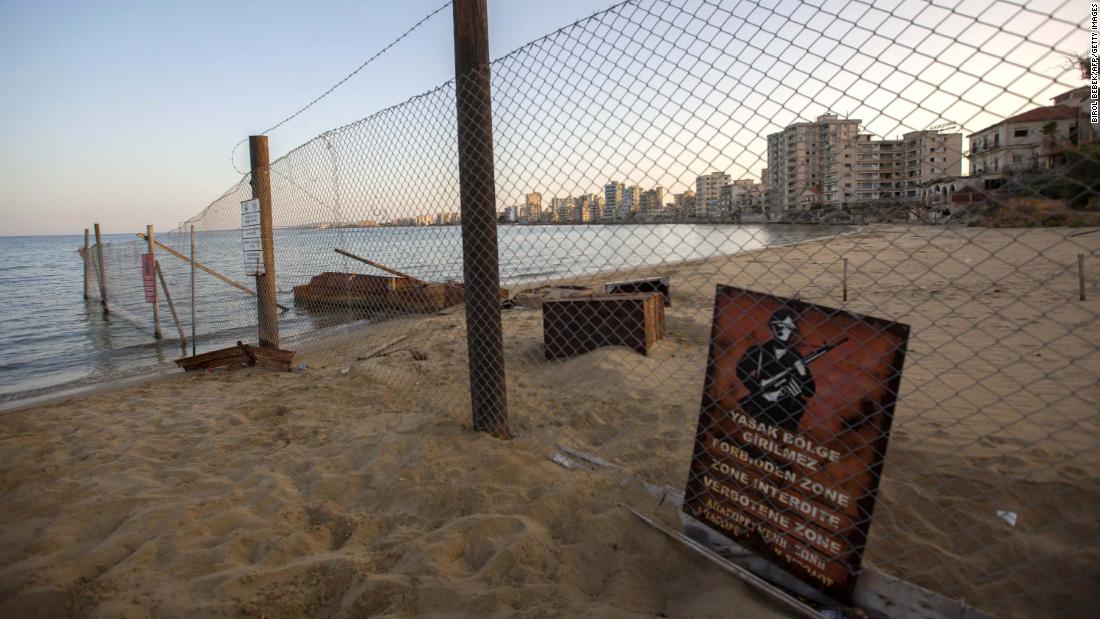The move has sparked international criticism.
Cyprus was divided in two in 1974 when a coup backed by the Greek government was met with a Turkish military invasion, partitioning the country between the Turkish-Cypriot north and Greek-Cypriot south.
For years the resort was closed to the public, until TRNC authorities said they planned to re-open the area.
Nedim Enginsoy/AP
For years, the once popular resort of Varosha — an abandoned district of the ancient city of Famagusta — acted as a no-man’s land between the north and the south. Entry to the area, which once attracted tourists from around the world, has remained forbidden to the public.
Authorities in August hinted at plans to open the town, which once boasted more than 12,000 hotel rooms, and was home to 25,000 residents.
Ersin Tatar, prime minister of the self-declared Turkish Republic of Northern Cyprus (TRNC), said Tuesday: “We are starting the process to make people use the public areas of our land, Sahil and Demokrasi streets, and the beach. Maras, which was like a ghost town, is now coming back to life.”
Referring to the district by its Turkish name, Tatar said: “God willing, we will start to use the Maras beach on Thursday morning together with our people.”
A woman with Turkish and Turkish Cypriot breakaway flags takes photos by a police-controlled gate to enter the beachfront of Varosha, an uninhabited, fenced-off suburb Thursday.
Nedim Enginsoy/AP
Turkish president Recep Tayyip Erdogan supported Tatar’s plan, saying Tuesday: “It is Turkish Cypriot authorities who have a right to say here. So under the light of this truth, we are fully supporting your decision of opening the beautiful beach of Maras for the use of your people, according to your road map.”
But the move prompted outrage from international authorities.
On Tuesday, the Republic of Cyprus government said it would protest over the “provocative and illegal action” to the UN Security Council and the European Union “as an act that violates international law and UN Security Council resolutions.”
The Cypriot government said in a statement: “[We] condemn in the strongest terms the decision of the occupier, Turkey, and one of its henchman in the occupied areas, Ersin Tatar, to extend the license for entry to the coastal front of Varosha, during a pre-election fiesta they held in Ankara, in the eve of the electoral process for the emergence of a new Turkish Cypriot leader.”
People with Turkish and Turkish Cypriot breakaway flags take photos of each other at the beach with abandoned buildings, in the background, after police opened the beachfront of Varosha on Thursday.
Nedim Enginsoy/AP
On Wednesday, Greece’s Prime Minister Kyriakos Mitsotakis said Turkey’s decision to extend entry to Varosha “is a clear violation of the United Nations Security Council Resolutions.”
“Greece is going to support all the relevant efforts of the Republic of Cyprus,” Mitsotakis said in his speech during an award ceremony in Thessaloniki.
Meanwhile, Josep Borrell, High Representative of the European Union for Foreign Affairs and Security Policy, said the EU was “deeply concerned” about the announcements.
He warned that the developments would “cause greater tensions and may complicate efforts for the resumption of Cyprus settlement talks.”
A spokesperson for António Guterres said the UN Secretary-General was concerned by the announcement on the reopening.
“He recalled that the position of the United Nations on Varosha remains unchanged and is guided by relevant Security Council resolutions,” Stéphane Dujarric, spokesperson for the Secretary-General said Wednesday.
“The Secretary-General stressed the need to avoid any unilateral actions that could trigger tensions on the island and undermine the return to dialogue or the future success of talks. He called on all parties to engage in dialogue in order to resolve their differences, and reiterates his readiness to bring the parties together,” Dujarric said.
CNN’s Gul Tuysuz and Martin Goillandeau contributed to this report.







